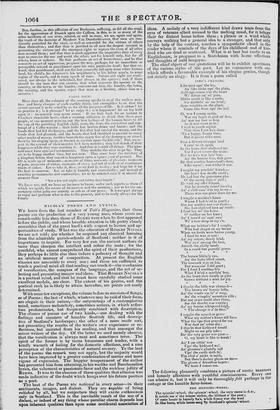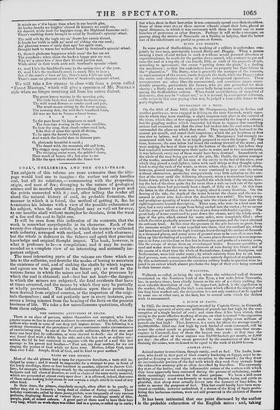NICOLL'S POEMS AND LYRICS.
WE learn from the last number of Tail's Magazine, that these poems are the production of a very young man, whose years are considerably less than those of BURNS were when he first appeared before the public, and whose humble situation in life pretty closely resembles that of the great bard's with respect to leisure and op- portunities of study. What was the education of ROBERT NICOLL we are not told; nor whether he acquired any classical learning from the admirable parish-schools of Scotland : neither is it of importance to inquire. For very few can the ancient authors do more than sharpen the intellect and refine the taste ; for the youthful, who cannot comprehend the spirit of their productions, they perhaps do little else than induce a pedantry of thought and an artificial manner of composition. At present the English classics are accessible to every one ; and these are sufficient to teach a poetical mind all that reading can teach it—the mechanics of versification, the compass of the language, and the art of se- lecting and presenting images and ideas. That ROBERT Mc °Lt.'s is a poetical mind, and that he must have carefully studied some excellent models, are clear. The extent of his genius, and the poetical rank he is likely to attain hereafter, are points not easily determined.
With some few exceptions, the volume before us consists of Songs, or of Poems ; the last of which, whatever may be said of their form, are elegaic in their nature,—the outpourings of a contemplative mind, sometimes melancholy, sometimes serious, in which reflec- tion predominates, but frequently combined with description. The classes of poems are of two kinds,—one dealing with the feelings and manners of humble Scottish life, and descrip- tive of' Scotland's landscapes; the other of a more made sort, not presenting the results of the writer's own experience or re- flections, but imitated from his reading, and that amongst the minor writers of the day. Of the latter we need merely observe, that the versification is always neat and sometimes terse. The spirit of the former is by turns humorous and tender, with a kindly warmth of feeling for the domestic affections, and a nice perception of the characteristics of natural scenery. To the best of the poems the remark may not apply, but the majority would have been improved by a greater condensation of matter and more vigour of expression. The happier temperament of the author has prevented him from attaining, in his warlike and Bacchanalian Lyrics, the vehement or passionate furor and the reckless jollity of BURNS. It was to the absence of these qualities that allusion was made indicative of the doubt which hangs over his future position as a poet. The best of the Poems are national in every sense—in their sentiments, images, and dialect. They are capable of being relished by all, but we conjecture they will excite enthusiasm only in Scotland. This is the inevitable result of the use of a dialect, or indeed of any thing whose peculiar charm depends less upon inherent qualities than upon some accidental association of ideas. A melody of a very indifferent kind draws tears from the eyes of veterans albeit unused to the melting mood, for it brings their far distant home before them ; a phrase or a word which conveys nothing but a general idea to a stranger, and that only by the help of the context, touches a sympathetic chord in the reader whom it reminds of the days of his childhood and of' kin- dred who are dead or scattered. What is at best but rustic to an Englishman, is pregnant to a Scotchman with home affections and thoughts of auld langsyne.
The chief object of our quotations will be to exhibit specimens of the various styles of the poet. Let us commence with one which affords a favourable example of his elegiac genius, though not strictly an elegy. It is from a poem called
TIME'S CHANGES.
Like mist upo' the lea, An' like nicht upo' the plain, Auld age comes o'er the heart We dolour am' wi' pain. Blithe youth is like a smile, Sae mirthfu' an' sae brief; Sync wrinkles on the cheek Come like frost up' the leaf.
0, war I young again, War my heart as glad an' free, Au' war illy foot as firm As it was wont to be !
I wad in youth rejoice .Mair than I yet ha'e dune :
'Tis a happy, happy time,
But it passes unco sunc.
Frac a distant stranger land I cam' to sit again In the haine that sheltered me
Ere I ;sell across the main: But its wa's war lyin' low,
Au' the bonnie tree, that grew By that couthie hamestead's door,
Like mysel', was wither'd noo.
I sought my youtlifie friend,— His heart was deadly cauld ; Ile bad lost the gamesome glee 0' the merry- days o' auld ;
He took my orrer'd hand,
But he scarcely raised his e'e ;
Au' a chill cam' o'er my heart—
There was use place there for me.
I sought a maiden's bailie Whom I had teeth in youth ; But nae maiden noo was there— She had slighted love an' truth :
I fund her wi' the bairn 0' anither on her knee ; An' I turn'd au' cam' awa' Wi' a tear-drop in my e'e.
Whan my brither's ha' I sought,
Wha had sleepit on my breast When we baith were bairns young,
I faud he was at rest : An' my sisters, dearly lo'ed, -War awa' amang the lave, Aneath the chilly inools In a could but peacefu' grave.
The burnie blithely ran, An' the lititie lilted sweet, The laverock was on hie, But mournin' I did greet ; For I fund I couldna What I lo'ed a inirthfu' boy, As the heart that dwalls in pain Grows without a wish for joy.
• a a • I thocht the hills war changed—
The brown an' bonnie hills, An' the woods sae fu' o' sang, An' the wimplin' mountain rills ; But nae years could alter them, Sae the thocht was vanitie; An' my bosom whispered laigh, " The change is a' in thee."
I sought the nameless grave Whar my mither's banes did lie- Whar the lips that prayed for ine
War dust an' ashes dry :
I thocht that kirkyard mould Might on use pity take ; But the very grave was gone- 0, toy heart is like to break !
An' I am sittin' noo
Upo' the kirkvard wa', An' gloamin's gfiaistly veil Upo' the earth doth The dud o' nicht is mirk,
But there's darker gloom on me—
The gloom o' friendless heart,: Ws' tears I canna see.
The following pleasantly combines a picture of rustic manners and homely affections with youthful reminiscences. Every one can admire it, but it will only be thoroughly felt perhaps in the cottage or the humble farm-house.
THE SP1NNING-WHEEL.
The spirinin'-wheel, the spinnin'-wheel, the very name is char, It minds me o' the winter nichts, the blithest o' the year ; 0' cozie hours in hamely ha's, while frozen was the wedl In ilka burn, while lasses sang by Seotlind's spinnia'-wheel.
It minds me o' tle happy time when in our boyish glee, At barley-bracks we laughin' chased ilk kinamer we could see, Or danced, while loud the bagpipes rang, the Highland foursome reel : There's naethiog dowie brought to mind by Scotland's spinnin'-wheel.
The auld wife by the ingle sits ale draws her connie thread, It hauds her baith in milk an' meal an' a'thing she can need ; An' gleesome scenes o' early days upo' her spirit steal, Brought back to warm her withered heart by Scotland's spinnin'-wheel.
0, there is gladsome happiness while roun' the fire are set The younkers ; when ahint the backs a happy pair are met, Wha wi' a silent kiss o' luve their blissed paction seal, While sittin' in their truth aside auk Scotland's spiunin'-wheel.
0, weel I lo'e the blackbird's sang in the spring-time o' the year, 0, wee! I lo'e the wielland's croon ii merry May to hear ; But o' the soun's 0' hive an' joy, there's nane 1 lo'e sae wee], There's nane sac pleasant as the bi rr o' Scotland's spinnin'-wheel.
We will take a few stanzas to close with from a poem called "Forest Musings,' which will give a specimen of Mr. Nicom. s style when no longer receiving aid from his native dialect.
The green leaves waving in the morning gale, The little buds that mid their freshness sing, The wild wood-flowers so tender-eved and pale, The wood-mouse sitting by the forest spring, The morning dew, the wild bee's woodland hum, All woo my feet to Nature's finest home. • • • To the pure heart 'tis happiness to mark The tree-tops waving in the warm sunshine, To hear thy song, thou cloud-embosomed lark, Like that of some fair spirit all divine, To lie upon the forest's velvet grass, And watch the fearful deer in distance pass.
0, gloriously beautiful is earth ; The desert wild, the mountain old and hoar, The craggy steep, upthrown at Nature's biith, The sweeping ocean wave, the pebbled shore, Have much of beauty all ; but none to me Is like the spot where stands the forest-tree



























 Previous page
Previous page